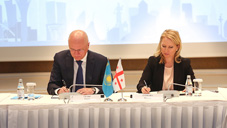Georgia and Kazakhstan Work on Development of Middle Corridor
By Natalia Kochiashvili
Thursday, April 25


New Minister of Economy and Sustainable Development, Natia Turnava is on an official visit in Kazakhstan. Georgian Minister Turnava met with the Minister of Industry and Infrastructure of the Republic of Kazakhstan Roman Sklyar. In the frames of the visit of the Minister of Economy and Sustainable Development of Georgia to Kazakhstan, the protocol of the 10th meeting of the Intergovernmental Commission on Economic Cooperation between Georgia and Kazakhstan has been signed.
At the session, the leaders discussed the development of the so-called “middle corridor”. The Trans-Caspian International Transport Route (TMTM) or Middle Corridor is an international transport corridor that runs through China, Kazakhstan, the Caspian Sea, Azerbaijan, Georgia and further to Turkey and European countries. Notably, the corridor avoids Russian territory.
According to Turnava, they discussed strategic issues at the meeting, such as the development of “middle corridor” concept that will ease cargo shipment and better introduce the transit function of both countries that play important role in attracting cargo flows from China to Europe via Black and Caspian Seas. The intensification of ferry traffic on the Black and Caspian seas was also discussed by two ministers.
Twitter Ads info and privacy
Within the visit to Kazakhstan, Minister of Economy and Sustainable Development Natia Turvanava held a meeting with Energy Minister Kanat Bosmbaev, during which the sides discussed bilateral cooperation. Ambassador of Georgia to Kazakhstan Zurab Abashidze, Executive Director of Partnership Fund David Saganelidze and Deputy Minister of Economy and Sustainable Development Genadi Arveladze attended the meeting with Kazakh Minister of Energy as well.
It was noted that Kazakh Kazakhstan, one of the major suppliers of petroleum products in the world, is planning to diversify transit routes and will consider transit of its products in the corridor to South Caucasus.
In 2018, Kazakhstan has exported a record amount of crude oil for the first time since 2013. The Georgian side named the Baku-Supsa oil pipeline as an alternative transit route for Kazakhstan's crude oil exports that would provide crude oil to the Black Sea markets.
Special emphasis was put on the Batumi Oil Terminal and Batumi Sea Port for further development of bilateral cooperation - Kazakhstan, which is interested in third countries in petroleum products by processing the crash Performance and open in this regard, the possibility of use.
It was also noted that Kazakhstan is part of the Transatlantic Corridor, together with Georgia and Azerbaijan, and the coordinated action can attract additional cargoes.
Special emphasis was put on the Batumi Oil Terminal and Batumi Sea Port for further development of bilateral cooperation Another priority area was revealed as well, namely, Kazakhstan, which is developing its own country petrochemical industry, is interested in creating processing industrial unit for exporting petrochemical products to developing countries.
At the meeting, Minister of Economy and Sustainable Development of Georgia, Natia Turunava, invited Minister of Energy of Kazakhstan at the Third Forum of Silk Road in Tbilisi in October 2019.
Within the visit to Kazakhstan, Minister of Economy and Sustainable Development Natia Turunava also held a meeting with Georgian business community operating in the country.
Discussions focused on Georgia-Kazakhstan business ties, priority directions for bilateral cooperation, increasing Kazakh investments in Georgia and opportunities for expansion of Georgian products exported to the Kazakhstan market.
At the meeting, Turnava and Georgian businesspersons discussed the possibility of opening a Georgian Culture Centre in Kazakhstan, where locals could not only get acquainted with Georgian culture but also get more information about products produced in Georgia, including those of Georgian wines that are less known in Kazakhstan as well as other food products.
The meeting also discussed how to increase the involvement of the Georgian business diaspora in Kazakhstan in the construction of transport and logistics infrastructure, medical centers, tourist facilities and hotel complexes in Georgia.
